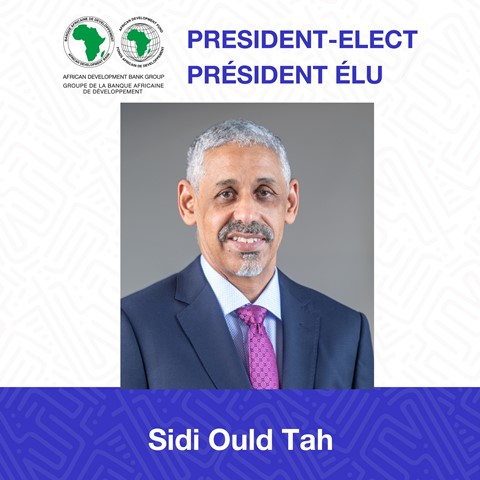In a landmark decision poised to shape the future of African development financing, Dr. Sidi Ould Tah, a seasoned Mauritanian economist and development financier, has been elected as the new President of the African Development Bank (AfDB).
He will officially assume office on September 1, 2025, succeeding Dr. Akinwumi Adesina, whose decade-long tenure has been defined by transformative initiatives in agriculture, energy, and regional infrastructure.
A Seasoned Visionary in Development Finance
Dr. Ould Tah’s election marks a continuation—and an evolution—of AfDB’s mission to drive sustainable development across the continent. Before his appointment, he served for a decade as Director General of the Arab Bank for Economic Development in Africa (BADEA), where he oversaw a dramatic expansion of the bank’s portfolio, increasing financial commitments to over $15 billion, including $10 billion directly supporting Africa’s development agenda.
Under his leadership, BADEA earned top-tier AA+/AAA credit ratings, positioning it among the most credible multilateral institutions globally. His hallmark initiative, the BADEA 2030 Strategy, was lauded for its long-term focus on infrastructure, private sector growth, trade development, and digital transformation.
This blend of strategic vision and financial prudence makes Dr. Ould Tah uniquely qualified to steer AfDB through its current challenges—including funding constraints, such as the recent $555 million cut in U.S. contributions, and rising development financing needs across the continent.
What his Presidency means for Rwanda
For Rwanda, Dr. Ould Tah’s presidency could not be more timely. The country has long been a key beneficiary of AfDB’s development financing, with ongoing support in areas such as transport infrastructure, renewable energy, agriculture, and urban development. As of 2025, the bank’s active portfolio in Rwanda includes flagship projects like:
- The Bugesera-Gasoro Road Project, enhancing regional connectivity and trade.
- Investments in hydropower and off-grid energy solutions, part of Rwanda’s push toward universal electrification.
- Financing for agricultural transformation programs, supporting food security and climate resilience.
Dr. Ould Tah’s proven ability to mobilize capital from Gulf states and beyond—while maintaining an emphasis on inclusive growth, regional integration, and innovation—aligns with Rwanda’s Vision 2050, which aims to position the country as a knowledge-based, upper-middle-income economy.
His prior experience working closely with East African governments through BADEA will likely accelerate resource mobilization and private sector partnerships, bolstering Rwanda’s ongoing infrastructure expansion and digital transformation efforts.
A Broader Vision for Africa
In his acceptance speech, Dr. Ould Tah emphasized a pan-African vision: “We must build an AfDB that is financially robust, strategically agile, and deeply responsive to the developmental aspirations of African countries. My focus will be on infrastructure, food sovereignty, climate finance, and fostering resilient economies.”
As the continent grapples with the dual pressures of post-COVID economic recovery and climate change, his leadership will be instrumental in guiding AfDB toward innovative financing instruments, increased collaboration with sovereign wealth funds, and stronger South-South cooperation.
Dr. Sidi Ould Tah steps into his new role with both formidable credentials and high expectations. For Rwanda, a country that has demonstrated efficient use of development finance and a consistent track record of implementation, his presidency could unlock new opportunities—especially in green growth, regional trade, and digital transformation.
As the African Development Bank navigates its next chapter, Rwanda and other member states will be watching closely to see how Dr. Ould Tah’s leadership translates into real, measurable impact across the continent.
